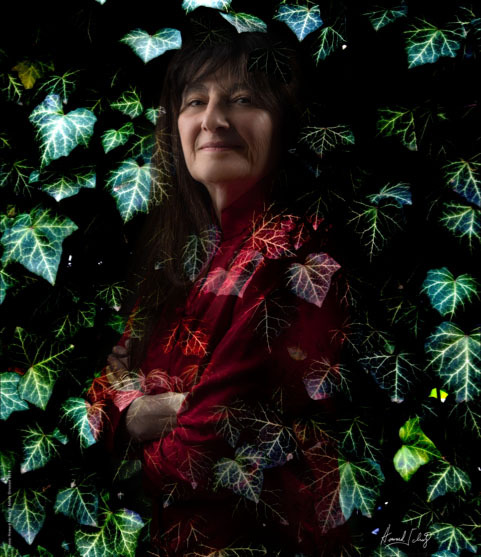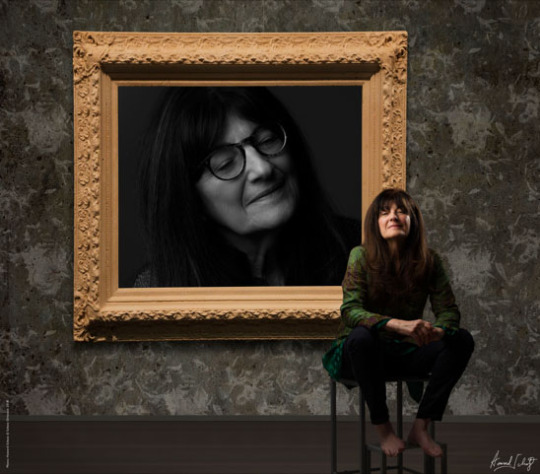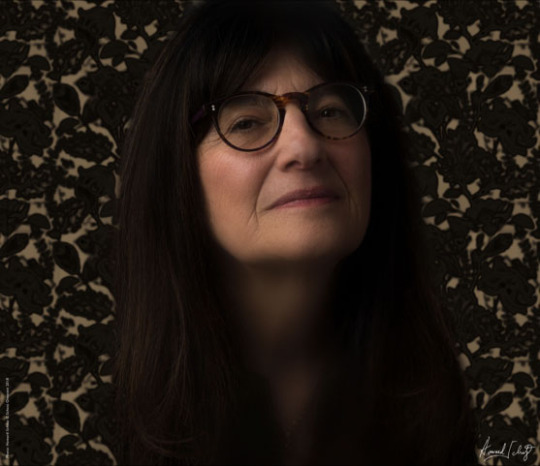On Seeing: A Journal – #255
May 15, 2018
“ABOVE and BEYOND: Ruth Reichl”

In last week’s post, I described my new project, “Above and Beyond, Portraits and Interviews of Extraordinary Individuals in Our Time.”
Recently, one of these outstanding people, the renowned food critic, editor and author Ruth Reichl came to the studio for a portrait and interview.
In the world of food, Ruth Reichl is both famous and formidable. Here is a shortened version of her exceptional resume:
Reichl was Editor in Chief of Gourmet Magazine from 1999 to 2009. Before that she was the restaurant critic of both The New York Times (1993-1999) and the Los Angeles Times (1984-1993), where she was also named food editor. As co-owner of The Swallow Restaurant, in Berkeley, California from 1974 to 1977, she played a part in the culinary revolution that took place during those years. In the years that followed, she served as restaurant critic for New West and California magazines.
She began writing about food in 1972, when she published Mmmmm: A Feastiary. Since then, she has authored the critically acclaimed, best-selling memoirs Tender at the Bone, Comfort Me with Apples, Garlic and Sapphires, and For You Mom. In 2014 she published her first novel: Delicious!
Reichl hosted Eating Out Loud, three specials on Food Network, covering New York (2002), San Francisco (2003), and Miami (2003). She is the executive producer of Gourmet’s Diary of a Foodie, public television’s 30-episode series, which debuted in October 2006, and Executive Producer and host of Gourmet’s Adventures with Ruth, a 10-episode public television series (2009). She was also a judge on Top Chef Masters.
She is the author of the recently published (September 2015) cookbook, My Kitchen Year: 136 Recipes That Saved My Life. She has been honored with six James Beard awards.

What follows is the interview I did with Ruth Reichl before making her portraits.
HS: I am very interested in creativity, imagination and inspiration and how even mistakes and failures can result in magical and wonderful results. As the editor-in-chief of Gourmet Magazine. You had the privilege of having a test kitchen. Can you tell me how those work?
RR: At Gourmet, we tested everything to literal absurdity. Every time someone made a dish, they would call out, “Taste!” Everybody would come leaping forward with their forks in hand and start viciously attacking whatever the dish was. And then everybody would critique it. The cook who had done it would take in all the information and criticism, and then do it again. For example, if we did a chocolate cake, we would do it with every chocolate on the market, because some chocolates work better with some recipes than others. We would experiment with the temperature or with the size of the pans. Some dishes were remade, literally, 20 times.
It was enormously expensive. Every day, vast amounts of groceries were delivered to the kitchens. But ultimately it was worthwhile. Because I know from testing cookbooks that most recipes don’t work very well. The Gourmet recipes really worked.
They really needed to work because people needed to trust our recipes. And actually, one of the things that I added when I got there was that every recipe was identified by the person’s name. So, if you were a cook having trouble with a recipe at home, you could actually call, for example, Jean Marie in the kitchen and say, “I’m baking your cake, and I’m having a problem.”
HS: In researching your work, I came across a statement you had made that resonated with me. “Recipes are a conversation, not lectures.” Would you elaborate?
RR: When I did my own cookbook, I wanted to inspire people to cook, which is a very different burden for a book. I wanted my book to make you want to run into the kitchen and make something. And I really hoped that you would take all my recipes and think that they weren’t perfect, that you could make it better by doing something that was to your taste. And that you would say, for instance, this lemon tart is too tart. And my lemon tart is too tart for many people, because I do really like tart flavors.
A personal cookbook is a dialogue with the reader. Mine was never a Julia Child cookbook. She marches you along, and you have to do everything exactly her way. And they’re very precise. I just want to give you the ingredients, then let you play around.
I’m a serious New Yorker. A lot of my inspirations come from wandering the streets. I eat in food courts. I eat in grubby little diners and dives. And I’ll taste something I really like and think, oh, rice sticks. Korean rice sticks. I didn’t even know they existed, but now I’m going to go buy some and play around with them and see what I can do with them.
HS: I want to ask about the role of women in your field. Yes, there’s you, there’s Julia Child, and there are one or two other women. But it seems as if men have gotten so much more attention.
RR: All the big newspaper editors are men, and all the big-deal editors in magazines, with the exception of a few women magazines, have been men. It’s been a very male field as well. Look at book publishing. The handful of famous editors, are all men. And I would certainly say that, as a woman, I’ve faced more harassment as a freelance writer than I ever did in restaurants.
As a freelance writer you’re very vulnerable, because you really want those assignments. Male editors behaved every bit as badly as chefs, and I think with less reason. Because really, when you look at the restaurant profession, most of it comes out of a very codified French system, and the French always made a distinction between professional chefs and cuisine de mère, mother’s food. And kitchens still are, though they’re not as uncomfortable as they were when I started working in restaurants in the sixties.
They were un-air-conditioned, often in basements. The temperature in those kitchens would get up to 120 degrees often. The guys would be there sweating and drinking and getting bawdier and bawdier as the night went on. And it was not pleasant to be a woman at eleven o’clock at night in one of those restaurants. And they really glorified machismo. I think partly because cooking was so much women’s work at home, to be a man and a cook, you had to be even more macho.
HS: Has it changed for women currently?
RR: It’s starting to change. The truth is that the famous chefs are, with very few exceptions, men.
HS: How would you advise a young woman who wanted to be a chef, who may or may not one day become very well-known and influential? What would you say to her?
RR: I would say, you’re really lucky. Your time is now. The #metoo moment has really changed everything. And they have the shoulders of many women to stand on now. There are lots of women who are raising their voices and mentoring young women; they are real role models. And I think that things this year are even different than they were last year, and that you can go work anywhere. And if you have a problem, it will be taken care of.
We have all put up with so much that we should never have put up, but we just thought, oh, that’s the price of doing business. That’s how you get forward. I know so many women who just accepted that they got hired because they had good legs; with Harvard degrees, etc. And nobody’s putting up with that anymore. And I don’t think you put that genie back in the bottle.
HS: Your generous nature comes across in everything. How does that jibe with your being a critic, given that some of the things you might write could be destructive?
RR: I don’t think I’m a natural critic. And when I started writing food criticism, I was very lucky to be writing for New West Magazine, which was a small sister publication of New York magazine, but not nearly as powerful. So I couldn’t make or break anything. And it was fantastic. I could write anything, and it wasn’t going to hurt anyone. I did that for six years and had a great time. Then I was asked to be the restaurant critic of the LA Times. And suddenly, my words had power. And that was really frightening. But I thought about myself and Doug, my first husband. We went out to eat once a year. We were so poor. My parents would send us a check for $25 for my birthday, and we would go to Chez Panisse in Berkeley. So I imagined some young couple who had just enough for one meal out a week. And, you know, they were the people who were paying my salary. And I thought, I owe it to them to be fair. And if I can’t tell them not to waste their money at a certain restaurant, I really shouldn’t be doing this job.
I think there are some critics who rejoice in writing mean reviews. And people love to read them. They’re great fun to read.
HS: As to your growth over the years: what have you learned about yourself and life from your work?
RR: You really have a choice about a million times a day to be kind or to be mean. And that it really behooves you to be kind. Being mean just doesn’t get you anywhere. I’ve really thought a lot about the people I have worked for. I had a couple of women bosses who were fantastic, who were both tough and generous and not full of themselves. And I pretty much decided to model myself on them. The other thing I’ve learned is to surround yourself with people who are smarter than you are. Hire people who can do things you can’t do. Learn all the time: keep learning.
I have watched food go from something that Americans were embarrassed about, ashamed of, to something that’s an important part of popular culture. We have now raised this incredible group of young people who really do understand why food matters and why eating is an ethical act, and who are convinced that if we want this world to go on they’re going to have to change the way all of us eat. That’s been really exciting.
HS: In an interview with Michael Krasny, the esteemed talk show host of KQED in San Francisco, you said, “Beauty can be earned through self-knowledge.”
RR: It’s certainly something I believe. We have a very, very narrow idea of what is beautiful. It’s all so mutable; it’s cultural, and it changes from society to society, and it changes with history. Real beauty, I think, comes with the kind of confidence that allows for generosity. I think that if you know and trust yourself, you move through the world in a very different way. And that makes you beautiful.

Yes, beautiful indeed.
If you have suggestions of other exceptional people we
ought to include in this project, please do let us know.
And if you like these weekly missives, please let others know about them.